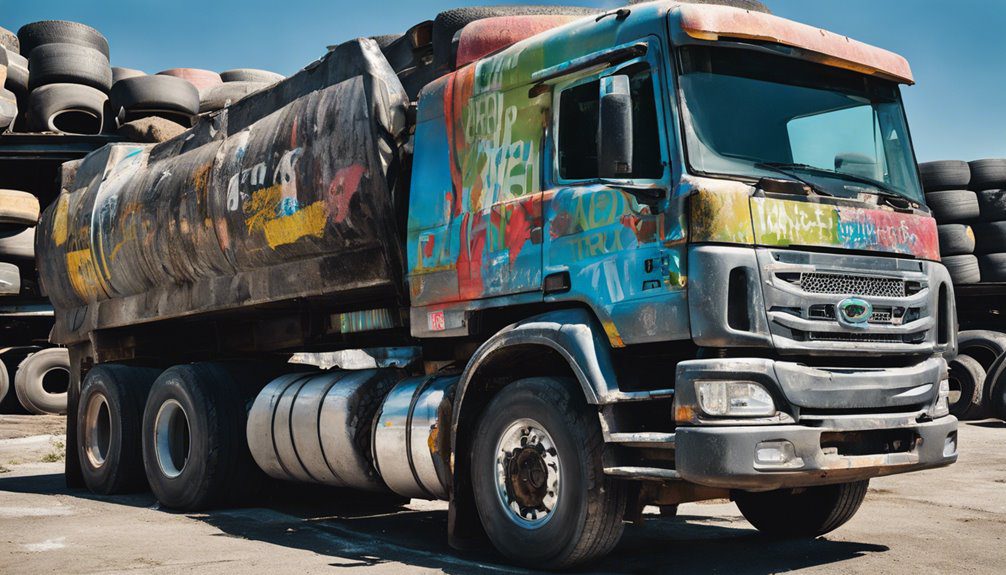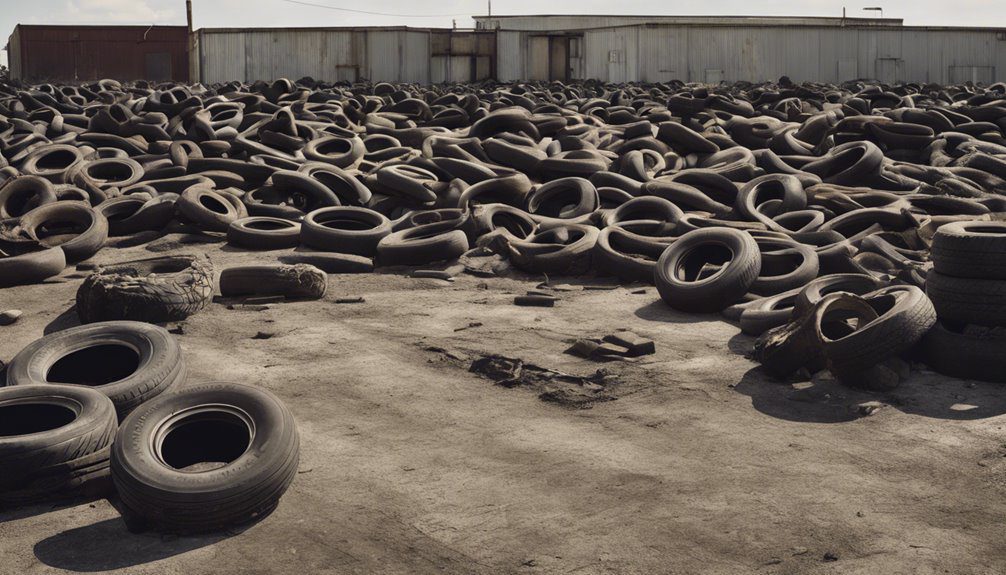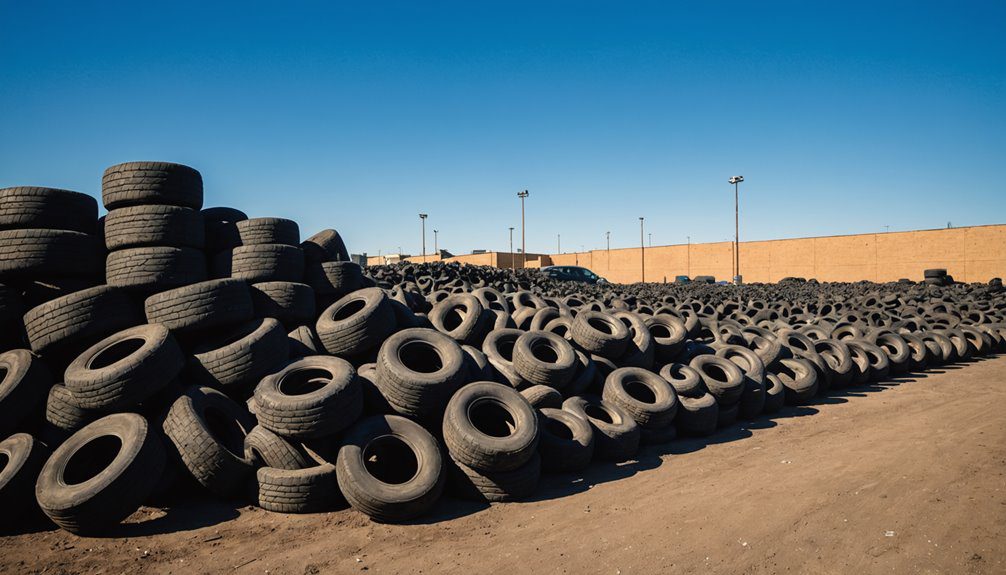If you're involved in waste tire hauling in South Carolina, you need to know about the $10,000 bond requirement. This bond isn't just a formality; it serves as a vital assurance of compliance with local regulations, impacting your credibility in the marketplace. You might wonder how this bond can influence your business operations and what steps you need to take to secure it. The implications stretch far beyond mere paperwork, and understanding them could be crucial for your success. What happens if you don't comply, and how can this bond benefit your community?
Overview of the Bond Requirement

When you step into the world of waste tire hauling, understanding the bond requirement is crucial. This bond acts as a financial safety net, ensuring that you're compliant with state regulations while protecting the environment.
In South Carolina, for instance, you're required to obtain a $10,000 bond before you can operate as a waste tire hauler. This bond is a way to guarantee that you'll adhere to local laws regarding the collection and disposal of waste tires.
If you fail to meet your obligations, claims may be made against your bond, which can lead to financial repercussions for you. It's not just a formality; it's a serious commitment that reflects your professionalism and responsibility in the industry.
The bond serves as a reassurance to both clients and regulatory bodies that you're financially capable of covering any potential damages or violations. Arkansas surety bonds are similar in that they facilitate compliance with local regulations, ensuring protection for all parties involved.
Before you start hauling tires, make sure you understand the steps to secure this bond. You'll need to work with a surety company, provide necessary documentation, and pay a premium.
Taking these steps not only fulfills legal requirements but also solidifies your reputation as a trustworthy waste tire hauler.
Purpose of the ,000 Bond
The $10,000 bond serves several key purposes for waste tire haulers. First and foremost, it acts as a financial guarantee that you'll follow all local regulations and laws related to waste tire management. By securing this bond, you're demonstrating your commitment to operating responsibly within the industry.
Additionally, the bond provides a safety net for clients and the state. If you fail to comply with regulations or cause environmental damage, the bond can be used to cover costs associated with cleanup or penalties. This protects the public and the environment from potential harm due to improper tire disposal practices.
Moreover, having the bond can enhance your credibility in the marketplace. It shows clients and partners that you take your responsibilities seriously, which can lead to more business opportunities. It also helps foster trust within the community, as stakeholders are more likely to engage with a bonded hauler.
Eligibility Criteria for Haulers

What do you need to qualify as a waste tire hauler? First, you must be a registered business in South Carolina. This means having a valid business license and meeting all local regulations.
You also need to demonstrate that you've got the proper equipment to transport waste tires safely. This includes vehicles that comply with state safety standards and are capable of handling the volume of tires you plan to haul.
Next, you'll need to prove that you're knowledgeable about waste tire management regulations. This includes understanding the environmental impact of tires and following disposal guidelines. You may also need to provide evidence of previous experience in waste management or a related field.
Additionally, you must maintain liability insurance to cover any potential damages or accidents that may occur during transportation. The state often requires a minimum coverage amount, so check those specifics beforehand.
Lastly, be ready to provide a clean compliance record. Any previous violations related to waste management could jeopardize your eligibility.
Meeting these criteria will put you on the right path to becoming a licensed waste tire hauler in South Carolina.
Application Process for the Bond
After meeting the eligibility criteria, you can start the application process for the waste tire hauler bond. First, gather the necessary documents, such as your business license, proof of insurance, and any relevant financial statements.
These documents help demonstrate your business's credibility and ability to comply with state regulations.
Next, contact a surety bond company or an insurance agent who specializes in bonds. They'll guide you through the specifics of the application process and provide you with the required forms.
Be prepared to answer questions about your business operations and financial stability, as these factors can affect your bond premium.
Once you've completed the application, submit it along with the required documentation and any necessary fees.
The surety company will review your application and may conduct a background check to assess your risk level. If approved, you'll receive your bond, which you'll need to keep on file and provide to the state as proof of compliance.
Consequences of Non-Compliance

Failing to comply with waste tire hauling regulations can lead to serious repercussions for your business. You could face hefty fines that accumulate quickly, jeopardizing your financial stability.
Regulatory agencies take violations seriously, and repeated offenses can result in increased penalties or even a complete suspension of your hauling operations.
In addition to financial consequences, your reputation may suffer significantly. Clients and partners often prefer to work with companies that adhere to environmental regulations.
If you're known for non-compliance, potential customers may choose to take their business elsewhere, impacting your bottom line.
Moreover, your business may be subjected to audits and inspections more frequently, diverting time and resources away from your core operations. This can hinder your ability to focus on growth and customer service.
Lastly, in extreme cases, non-compliance can lead to legal action against you or your business. This could result in not only fines but also potential criminal charges, depending on the severity of the violation.
To avoid these dire outcomes, it's crucial to stay informed about regulations and ensure that your operations remain compliant.
Benefits for the Community
Communities stand to gain significantly from effective waste tire hauling practices. By ensuring proper disposal of waste tires, you'll help reduce environmental hazards that come from tire stockpiles. Tires can attract pests and become breeding grounds for mosquitoes, which pose health risks. With proper hauling, you'll minimize these risks and contribute to a healthier community.
Additionally, effective waste tire management can enhance local aesthetics. Piles of discarded tires can create an unsightly view, affecting property values and community pride. When tires are removed responsibly, your neighborhood looks cleaner and more inviting.
Moreover, you can also stimulate the local economy. By supporting licensed waste tire haulers, your community invests in businesses that comply with environmental regulations. This can lead to job creation and encourage sustainable practices within your area.
Lastly, proper waste tire disposal can open up opportunities for recycling and repurposing. Many tires can be transformed into useful products, such as rubber mulch or fuel, benefiting both the economy and the environment.
Conclusion
In conclusion, securing a $10,000 bond is essential for waste tire haulers in South Carolina. It not only ensures compliance with regulations but also builds trust within the community. By meeting the bond requirements, you protect your business and contribute to environmental sustainability. Plus, having this bond opens up more opportunities for growth and credibility in the marketplace. Embrace this responsibility, and you'll see the positive impact it has on both your operations and the community.


